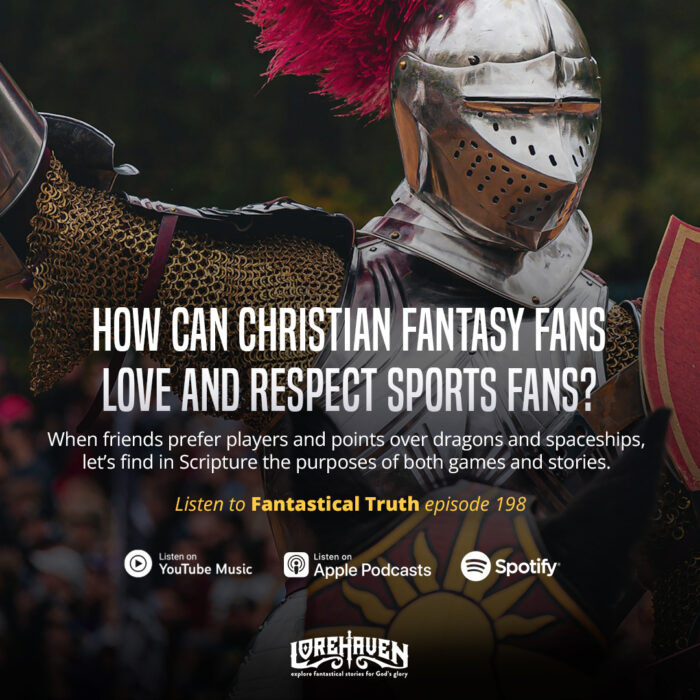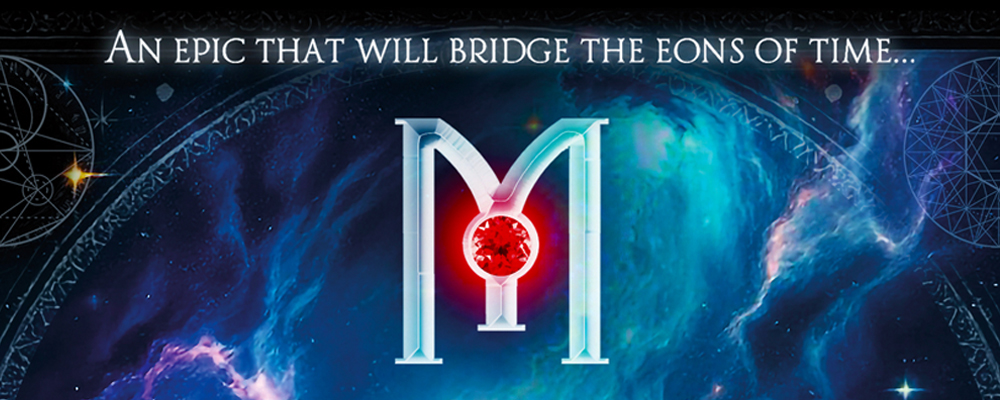198. How Can Christian Fantasy Fans Love and Respect Sports Fans?
Podcast: Play in new window | Download (Duration: 1:04:25 — 60.3MB) | Embed
Did you know that this week hosts a major competitive American sporting event?[Photo by Matt Benson on Unsplash.] Instead of XP, they have “scores.” Instead of combo moves and puzzle-solving, they have “plays.” Instead of dying and respawning, they have “losing,” and instead of save points, they have “yard lines.” How can Christians who love fantasy show love and respect to other kinds of fans who enjoy sports?
Episode sponsors
- Enclave Publishing: Mortal Queens
- Return of the Lost Ones by David Liberto
- Realm Makers: 2024 writers conference
Mission update
- New reviews every Friday, including for Secret of the Lost Dragons
- And this Friday, more dragons: The Fox and the Dragon
- Subscribe free to get updates and join the Lorehaven Guild
Concession stand
- Stephen is not a sports fan, though part of him wishes he could be.
- Sports bring up strong feelings in people, often for, sometimes against.
- Our point here is to avoid cheerleading either, but look to Scripture.
1. The pros: Why do many fans totally love sports?
- Emphasis on physical training and competition that builds character.
- Wholesome abilities to show natural love for one’s city, state, or country.
- Friendly rivalry that simulates “war” with others but for simple joy’s sake.
- Christian author Randy Alcorn reminds us that sports are good
- See his big book Heaven, pages 410–411
- Sports in Heaven?, Eternal Perspective Ministries, June 10, 2014
- And of course, many sports stars overtly glorify Jesus and the gospel
2. The cons: How do fantasy fans feel about sports?
- Uniform expectations for body types, physical athleticism, and sex roles.
- Regional patriotism twisted into idolatry for favorites, hatred for others.
- Obsession with statistics, players, and idols that excludes other reality.
- Many fantasy fans testify to bullying, even at home, over sports culture.
- Parents, relatives, and church folks can get really into this fandom.
- It may help to compare this with “toxic fans” of our own favorites.
3. How can fantastical sports connect us together?
- Stephen finally unlocked a bridge between fantasy and sports fandoms.
- Quidditch certainly helped. So did an anime’s “wizards compete” story.
- All the same values (and possible idols) can “translate” this way.
- Applications for as soon as this Sunday, day of the annual “Big Game.”
- Stephen is trying to avoid even gentle mockery about “sportsball.”
- He’ll actively ask about others’ fandoms, and make human connections.
Com station
Top question for listeners
- Do you speak “sports fandom” as well as “fantasy fandom”?
Mahina in the Lorehaven Guild liked ep. 197 about gaming:
Wow, I’m so interested in this. I’m not really a gamer but a fan of stories. I downloaded the Redwall Lost Legends game. Me and my sisters loved these books! It’s literally choose your own adventure book with music and graphics. Very fun for a reader! I don’t have any kind of game consul or computer other than a small laptop but my sister has a PS4 and we had so much fun playing through Jedi Fallen Order. We are waiting for the next one to come out on PS4. When done together, playing these games is about having an adventure and fellowship. Especially when you’re super frustrated and can’t beat a boss.
Next on Fantastical Truth
‘Tis the season for love and enchanted princesses and handsome princes and such-like. But lately, former fans of these ideas just aren’t feeling it, especially from the Disney side of our magical fandoms. When the Big Mouse keeps getting into big trouble, how’s a Christian fan to respond? Joshua Shepherd brings a balanced biblical perspective into the studio.
























I’m definitely more on the ‘speaking fantasy fandom’ end of the spectrum, since I have practically no interest in sports. That said, I never had too much issue with people liking or talking about sports. They have their world and I have mine, so to speak. Or, put another way, they have their job and I have mine.
Something that probably helped with developing that outlook was that, when I was a little kid and my parents would talk about food preferences, they would say things like ‘Everyone has different tastes’ and ‘Everyone has different taste buds’. When it came to art, people would also talk about the difficulty in producing pieces that people like or would be willing to buy, which also brought up the fact that everyone has different preferences. Some people will like a particular artwork, and some people won’t. That’s ok — artists don’t have to feel like it’s the end of the world if a person dislikes something they made and, conversely, no one has to feel bad for disliking a particular piece. As someone who wanted to be an artist, that was a vital thing to learn. And I started translating that mindset onto most other things in life, including my outlook on sports vs stories.
The part where it probably gets hard for most people is where they feel like they are forced to engage with sports in some way, or if they’ve been picked on by sports fans in the past. None of my immediate family cares about sports, no one at school really bothered me about it, and growing up I was taught a lot of the Christian perspectives on how to deal with ostracization without turning into a hateful person. That makes it a lot easier to develop boundaries and say no to things without resenting the other person or expecting other people to change their tastes. That didn’t change the fact that me and the people I grew up with still had strong opinions, preferences and morals, but there was still this deep acknowledgement of the fact that everyone was different and that it was fine, and even good, for everyone to like different things. Obviously I’m not perfect at this — no one is, but learning this at a young age does help a lot, and it’s something we should try to exemplify and teach the next generation.
As a side note, there actually were reasons why Anakin ran that race. A huge plot point in that movie was that the Jedi were trying to free the planet of Naboo, and they ended up crash landing on Tatooine. Their ship was damaged so badly they couldn’t leave without buying the parts they needed to fix it, and the Republic credits they had were not an accepted form of currency on Tatooine. That means they didn’t even have the money to buy parts to leave the planet and continue their vital mission…which also means they couldn’t just buy Anakin’s freedom. Anakin wasn’t just running the race for the sake of his own freedom(he didn’t know that was on the table in the first place), he was also participating in the pod race because he loved it and wanted to help the Jedi. There were a lot of lives at stake if the Jedi were unable to leave, Qui Gon could see that Anakin had a unique skill set that would give him an edge, and was realizing that Anakin was the Chosen One and that it was vital to help him become a Jedi. In that situation, the race was the best way to accomplish all that.
There were multiple characters that expressed worry and concern for Anakin’s safety in this, and that was part of the decision making when it came to whether or not Anakin would participate. His mother let him participate out of kindness and because her son wanted to, and the Jedi let him participate out of desperation for their mission, the desire to free him, and because of the whole Chosen One thing. Anakin lived on a rather dangerous planet and in a dangerous universe. Although there would have been concern over safety, people living in such situations are willing to take risks and rise to the occasion in order to protect what they love or to gain something important. In that sense, the show is realistic. We live in such a safety focused society that we forget what it’s like for people that live beside danger every day.